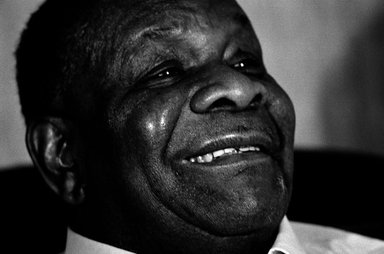Sound System Pioneer

A legendary selector (DJ) and one of the first black club owners in Britain, Count Suckle had an incalculable impact on London and UK culture. His nights and clubs were epicentres for an international clientele. Many artists owe a debt to Suckle, though few speak of his influence.
Born Wilbert Augustus Campbell in Kingston, Jamaica, Count Suckle – so called because he suckled on his mother’s teat for longer than is considered usual – was blessed with business acumen. As a teenager, he began providing the sound system selectors with American records. Suckle purchased them from sailors docking in Jamaica and sold them on for a profit. In 1954, at the age of 23, he decided to move to London, stowing away on a ship with friend and fellow soundman Duke Vin. Together, they made the 22-day journey to Britain.
Upon arriving in England, Count Suckle moved to Notting Hill. His major complaint was that he couldn’t find music to dance to, so he and Duke Vin drew from their experiences in Jamaica. Duke Vin built the first soundsystem and Suckle followed suit. They would rent out their equipment and play at house parties and shebeens; their rivalry led to dramatic soundclashes against each other, the first at Lambeth Town Hall. Initially playing American RnB, they soon began to play Jamaican records. They brought new sounds to London, importing freshly cut Jamaican dubplates and incorporating them into sets alongside pop and RnB.
Suckle’s reputation for spinning commercial tunes gave him an edge over rivals. He won his first booking at the Flamingo Club and before long, he was the man to see. His music collection and his sets were widely popular. This led to his residency at Soho's Roaring Twenties and soon-to-be-famous faces, like Mick Jagger and Elton John, became very loyal fans. The UK's emerging talent was profoundly influenced by the rhythms of the dance. However, door policy was an issue; black clientele were often denied entry. Suckle used his success to persuade the management to allow patrons of all races into the club.
The success of this venture enabled Count Suckle to open his own venue: The Q Club. Situated in Praed Street, Paddington, its doors opened in 1964. It became a definitive venue of the London night and Suckle demanded that patrons dress well. Muhammed Ali, Stevie Wonder and the Commodores would all walk through his door. The Q Club always played popular music to the tastes of the crowd, while also splicing sets with the newest records from Jamaica. The club closed its doors in 1980 and while Suckle could have amassed a fortune from his venture, his love of gambling saw his wealth squandered.
Count Suckle’s influence on the culture of his time is incalculable. Rock legends learnt their trade and networked at his nights. Sounds emerging in the Caribbean were pumping from speakers in London shortly after they were produced. The emcees, DJs and rockers of the modern day have all been influenced by Suckle, many without knowing it.
Born Wilbert Augustus Campbell in Kingston, Jamaica, Count Suckle – so called because he suckled on his mother’s teat for longer than is considered usual – was blessed with business acumen. As a teenager, he began providing the sound system selectors with American records. Suckle purchased them from sailors docking in Jamaica and sold them on for a profit. In 1954, at the age of 23, he decided to move to London, stowing away on a ship with friend and fellow soundman Duke Vin. Together, they made the 22-day journey to Britain.
Upon arriving in England, Count Suckle moved to Notting Hill. His major complaint was that he couldn’t find music to dance to, so he and Duke Vin drew from their experiences in Jamaica. Duke Vin built the first soundsystem and Suckle followed suit. They would rent out their equipment and play at house parties and shebeens; their rivalry led to dramatic soundclashes against each other, the first at Lambeth Town Hall. Initially playing American RnB, they soon began to play Jamaican records. They brought new sounds to London, importing freshly cut Jamaican dubplates and incorporating them into sets alongside pop and RnB.
Suckle’s reputation for spinning commercial tunes gave him an edge over rivals. He won his first booking at the Flamingo Club and before long, he was the man to see. His music collection and his sets were widely popular. This led to his residency at Soho's Roaring Twenties and soon-to-be-famous faces, like Mick Jagger and Elton John, became very loyal fans. The UK's emerging talent was profoundly influenced by the rhythms of the dance. However, door policy was an issue; black clientele were often denied entry. Suckle used his success to persuade the management to allow patrons of all races into the club.
The success of this venture enabled Count Suckle to open his own venue: The Q Club. Situated in Praed Street, Paddington, its doors opened in 1964. It became a definitive venue of the London night and Suckle demanded that patrons dress well. Muhammed Ali, Stevie Wonder and the Commodores would all walk through his door. The Q Club always played popular music to the tastes of the crowd, while also splicing sets with the newest records from Jamaica. The club closed its doors in 1980 and while Suckle could have amassed a fortune from his venture, his love of gambling saw his wealth squandered.
Count Suckle’s influence on the culture of his time is incalculable. Rock legends learnt their trade and networked at his nights. Sounds emerging in the Caribbean were pumping from speakers in London shortly after they were produced. The emcees, DJs and rockers of the modern day have all been influenced by Suckle, many without knowing it.


